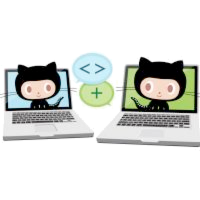Answer
Georgia Tech has licensed GitHub Enterprise and offers the service for use in research, instruction and administrative projects. You can reach the service at the following URL:
What is git?
git is a distributed version control and source code management system commonly used by software programmers.
What is GitHub.com?
GitHub.com is an Internet site that offers git hosting services allowing you to easily share code with others. GitHub offers limited free plans for educators and students.
What is GT GitHub Enterprise?
GitHub Enterprise is the on-premise version of GitHub.com. Georgia Tech has licensed GitHub Enterprise and offers the resource for use in research, instruction and administrative projects.
Who can use it?
The main intent of providing the service was to support GT courses, however any faculty, staff or student of Georgia Tech is allowed an account on the GT GitHub Enterprise server. Access is controlled with your GT credentials. Georgia Tech offers an unlimited, free campus-wide student license that covers students, faculty, and anyone working directly with students in an educational capacity.
Can I use github.gatech.edu for GT non-educational purposes?
Yes, but the Institute will incur a cost. OIT will cover the license costs, however you will need to report that you are doing so. At the moment, we do not have the details for this process. Check back here for more details.
How do I access it?
- A web browser (https://github.gatech.edu/)
- A graphical application
- Command line
Why should I use github.gatech.edu rather than github.com?
The GitHub Enterprise service at GT is a free, locally managed service using GT credentials that offers many advantages over GitHub.com:
- You can create an unlimited number of private repositories.
- It provides a campus resource for non-open source projects. GitHub.com's free signup requires an agreement that your code is open source. GitHub.com's paid signup allows non-open source.
- Integrates with GT credentials. Provides non-GT collaborator access via GT Passport guest sponsorship.
When should I use github.com, instead?
When you need to create public repositories. The GT GitHub Enterprise server does not support public repositories.
Why should I use private repositories?
- It protects intellectual property. Private repos help protect projects in which the researcher has yet to obtain a copyright or patent.
- It protects sensitive research data, such as private industry sponsored, non-disclosure, etc. However, this server is not suitable for export control, ITAR, etc. projects.
- It protects student information (FERPA).
What kind of data can I store on github.gatech.edu?
OIT has cleared the use of the GT GitHub Enterprise server for category 3 data, which includes FERPA and non-sensitive research data. The service is not available for export control, ITAR, etc. projects.
Is there a storage quota?
Unlimited quota, within reason. What this means is that if you are one of the largest storage consumers on the server, you might get a call from OIT or TSO one day asking what you are doing.
What is the support policy?
OIT is providing backend server and software support for GitHub Enterprise, as well as funding the annual software license. OIT does NOT provide end user, front-end technical support or explain how to use git. If you have a question about the GT GitHub Enterprise service, you can send a request to help@cc. If you want to learn how to use git, see the next FAQ entry regarding educational resources.
Are there any git tutorials?
GitHub.com, LinkedInLearning and Github.io are great places to learn about git:
- Guides: Tutorials, tips, and workflows to help you and your team learn about GitHub.
- Classes: Monthly free, online classes about GitHub, Git, and the union of these two technologies (and free events following these online classes that allow you to get answers directly from GitHub Experts.)
- LinkedInLearning - GitHub for Web Designers
- LinkedInLearning - Fundamentals of Software Revision Control
- Learn Git Branching - A good interactive visual guide to Git's concept of version control.
